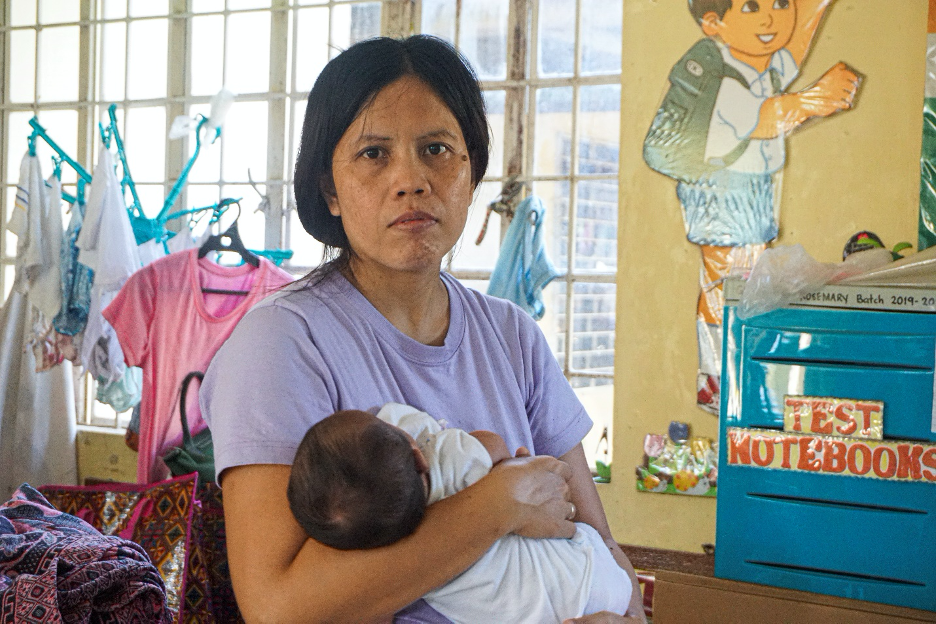Oxfam Pilipinas, together with the Department of Health and other l non-government organizations, visited an evacuation area to assess the immediate needs of those affected by the Taal Volcano eruption in Batangas. (Photo: April Bulanadi/Oxfam)
When Taal Volcano erupted in January 2020, over 70,000 people were forced to take shelter in 300 evacuation centers – the start of a long period of displacement for many. A state of calamity was declared for the entire Calabarzon region. Local authorities expect this to be in effect for the rest of the year.
Elizabeth Embrado had just given birth to her child when Taal Volcano erupted in January. Fearing for their safety - because they lived just a few kilometers away from Taal Lake, in Barangay Nangkaan, in the town of Mataas na Kahoy -she and her family immediately evacuated. Elizabeth's family stayed at a school, which served as the local government's temporary evacuation facility back in January.
Along with displacement is the loss of livelihoods of thousands who rely on agriculture for a living, especially those who are subsistence farmers and fishers. The Department of Agriculture estimated damage to crops to be over $60 million, while local fisheries suffered more than $30 million in damages. This was another burden faced by Elizabeth's family, whose husband works as a fisherman. She said her husband had to stop fishing in the lake because of the eruption. All of this while they had new financial needs with their newborn.
Elizabeth, with her one-month-old baby, in a classroom which serves as a temporary evacuation center in Mataas na Kahoy town, Batangas province. Elizabeth and her baby are among those displaced by the Taal Volcano eruption in January. (Photo: April Bulanadi/Oxfam)
The loss of livelihoods will impact the recovery of affected communities for a long time to come. Humanitarian and development agency Oxfam highlighted early on the need for emergency response plans to anticipate the prolonged displacement of communities within the hazard zone. There was initially an outpouring of support to help displaced families, but there is a critical need to ensure that support continues into the recovery phase.
During Oxfam’s visit to Elizabeth and other displaced families in January, while they expressed gratitude for the relief assistance they received from various groups, they expressed how they would actually much rather receive cash assistance. Indeed, cash support would empower Elizabeth and others to prioritize their needs and increase their sense of self-worth, dignity, and control over their lives. For Elizabeth, her priority needs were essential items for her newborn baby, and livelihood support.
“Our experience in responding to humanitarian emergencies has taught us how economic empowerment is critical to the resilience of Filipinos, particularly women from marginalized communities. This includes access to financial services, access that can be facilitated increasingly through digital platforms. Not only that, digital financial technologies also provide a safer and more dignified way to support affected communities, and help jumpstart local economies by increasing people’s access to financial services,” Oxfam Pilipinas Country Director Lot Felizco said.
Digital financial technology is playing a key role in helping communities in the recovery effort. Oxfam has partnered with Singapore-based FinTech, LenddoEFL, for its digital identity verification solution, known as electronic know your customer (eKYC). This technology allows the user’s identity to be verified faster and more effectively, directly from their mobile device. This enables cash to reach the recipient more efficiently during a humanitarian response. LenddoEFL is providing its services free of charge to support the disbursement of funds to families displaced by the eruption.
“The task of rebuilding requires a considered and tailored approach, guided by those on the frontlines. It is through authentic partnerships, like Oxfam and LenddoEFL, that effective change can be made,” LenddoEFL CEO, Paolo Montessori said.
“We are a mission-driven company, and we are proud to be working with Oxfam at this critical time for the people in the Calabarzon region,” Montessori added.
LenddoEFL first partnered with Oxfam Philippines in 2018 following the devastation wrought by Typhoon Ompong. LenddoEFL’s eKYC solution was deployed to streamline financial assistance to over 1,000 farmers in Cagayan province.
This means the registered farmers were able to access a wide range of financial services, including savings accounts and loans from Philippine financial institutions, in line with regulations of the Bangko Sentral ng Pilipinas (BSP). Regulations in the Philippines have required face-to-face or real-time online interviews to register new-to-card, or new-to bank current account/savings account customers. With this innovation, farmers could be verified faster and more conveniently from their mobile phones.
About LenddoEFL
LenddoEFL offers software solutions to bridge the gap between lenders and the underserviced. Financial Institutions trust our software solutions to power their financial products, enabling them to reach previously untapped market segments, driving their bottom line. LenddoEFL is built upon over ten years of academic investment purely in risk and decision-making algorithms, having been founded at Harvard. We use AI and advanced analytics to bring together the best sources of digital and behavioral data to help lenders in emerging markets confidently serve underbanked people and small businesses.
About Oxfam
Oxfam is an international confederation of 20 organizations networked together in more than 90 countries, as part of a global movement for change, to build a future free from the injustice of poverty. Oxfam Pilipinas has been working in the country for more than 30 years. Its goal is to contribute to the eradication of poverty by supporting women and other vulnerable groups in saving lives and building livelihoods, enhancing their resilience to crises, and making their voices heard of holding duty-bearers accountable.
Header Photo by Lance Lozano on Unsplash






